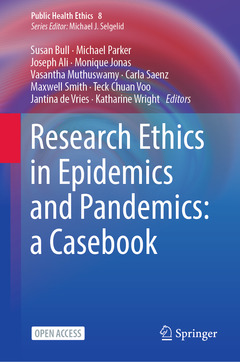Description
Research Ethics in Epidemics and Pandemics: A Casebook, 1st ed. 2024
Public Health Ethics Analysis Series, Vol. 8
Coordinators: Bull Susan, Parker Michael, Ali Joseph, Jonas Monique, Muthuswamy Vasantha, Saenz Carla, Smith Maxwell J., Voo Teck Chuan, Wright Katharine, de Vries Jantina
Language: English
Subject for Research Ethics in Epidemics and Pandemics: A Casebook:
190 p. · 15.5x23.5 cm · Hardback
Description
/li>Contents
/li>Biography
/li>Comment
/li>
This open access casebook addresses complex and important ethical challenges arising when health-related research in conducted in the context of epidemics and pandemics. This book provides contextually-rich real-world case studies illustrating research ethics issues encountered by researchers, ethics reviewers and regulators around the globe during the COVID-19 pandemic. The accompanying commentaries outline relevant conceptual approaches and ethical considerations. These promote understanding and reflection on relevant ethical issues, ethical approaches and competing considerations in a manner supporting thoughtful evaluation of their implications for practice. As such the casebook is relevant to academic and professional audiences with an interest in global health, research ethics, and outbreaks and epidemics.




